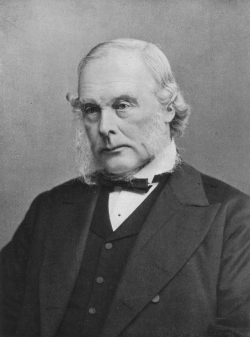Sir Joseph Lister

- Born
- 5 April 1827
- Died
- 10 February 1912 (age 84)
Joseph Lister made a ground breaking contribution to medicine when he proposed the basic principles of surgical hygiene. He introduced the aseptic technique to minimise postoperative infections and established a general code of cleanliness in hospitals.
Joseph Lister graduated with honours from University College London as a Bachelor of Medicine in 1852. He continued his studies in London and later that year he became a Fellow of the Royal College of Surgeons.
He was a fluent in French and German, the two leading languages of medical research at the time, and this assisted his contribution to research. He soon presented new principles of cleanliness in surgical practice that reduced infections and led to an increased survival rate. Lister was also passionate about finding new ways to improve the surgical techniques of the time.
Later he was intrigued by a microbiology paper written by French chemist Louis Pasteur which led him to conduct his own experiments. He used the findings to develop antiseptic techniques for wounds.
In 1867 he used carbolic acid (phenol) as an antiseptic and the positive results soon led it to become the first widely used antiseptic technique in surgery. He published his results in The Lancet in a series of 6 articles which are still widely read by modern scientists.
Joseph Lister’s whole life revolved around his work and even when retired he continued to advise King Edward VII's surgeons. Later the King told Lister:
I know that if it had not been for you and your work, I wouldn't be sitting here today.
This page was written by a Biology: Changing the World volunteer.



